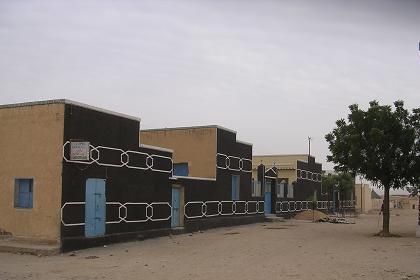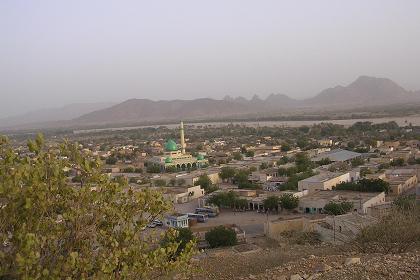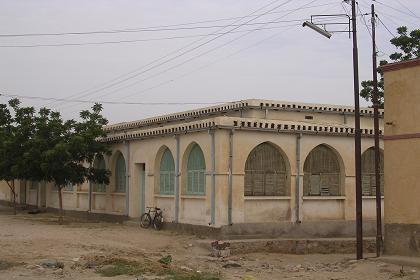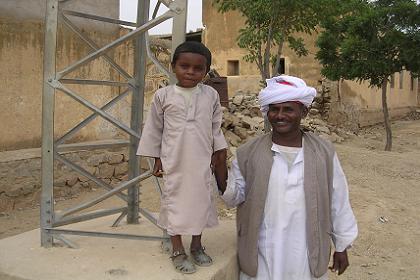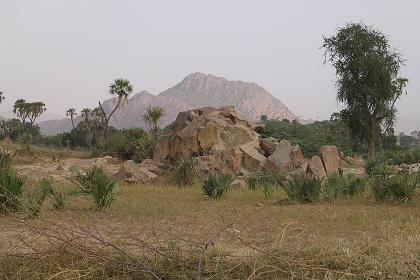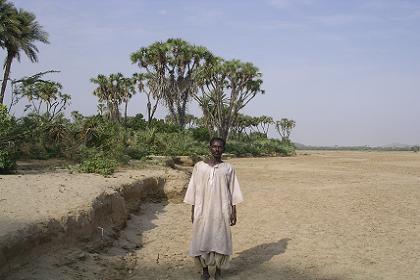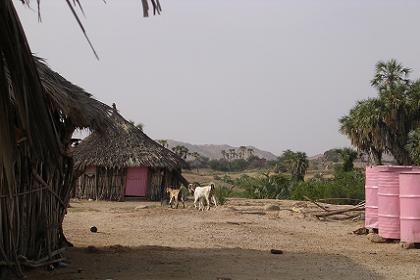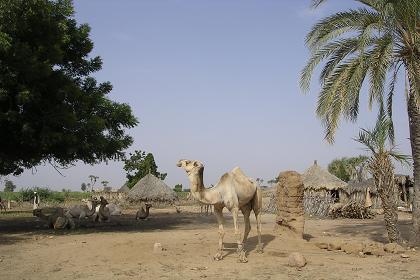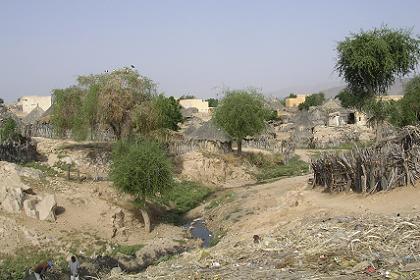| Eritrea September 2004 | ||||||
| Mon | Tue | Wed | Thu | Fri | Sat | Sun |
| 01 | 02 | 03 | 04 | 05 | ||
| 06 | 07 | 08 | 09 | 10 | 11 | 12 |
| 13 | 14 | 15 | 16 | 17 | 18 | 19 |
| 20 | 21 | 22 | 23 | 24 | 25 | 26 |
| 27 | 28 | 29 | 30 | |||
| Eritrea October 2004 | ||||||
| Mon | Tue | Wed | Thu | Fri | Sat | Sun |
| 01 | 02 | 03 | ||||
| 04 | 05 | 06 | 07 | 08 | 09 | 10 |
| 11 | 12 | 13 | 14 | 15 | 16 | 17 |
| 18 | 19 | 20 | 21 | 22 | 23 | 24 |
| 25 | 26 | 27 | 28 | 29 | 30 | 31 |
| next page | previous | |||||
| September
- October 2004 One Heart |
||||||
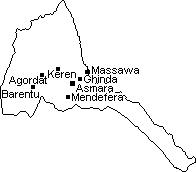 |
||||||
Agordat Eritrea - September 29th 2004
There is no breakfast service in Almaz' pension, so I leave the hotel early in the morning to find a restaurant to eat some bread. When I pass the market, one of the men invites me to sit next to him. We drink a mixture of milk and tea. He also offers me a small local snack.
The fact that the people of Agordat are preparing my breakfast, strikes me. In our culture everyone is trying to exploit tourist. Here they are treating them like their family! When I walk a few blocks, I am invited again. The men offer me a chair and a cup of tea.
From the city center I walk to the Barka river. When I pass a man walking with his son, he asks me to picture them. When I am close to the river, another man is shouting in my direction. I have to wait for him. Not knowing the reason, I just wait. He tells me to walk with him, just for my own safety.
In the bushes that border the river, I see one of the reasons: A giant snake, like the one demonstrated in the Expo area, but this time wild and therefore looking for food. I guess I am to fat for the snake, so there is no reason to panic. He will prefer an easier victim. We walk a few hundred meters in the dry river bed.
The man explains what is to be seen in just a few words. "Banana trees. Eagle!" The broken earth crust crackles under our feet. Thousands of birds give a concert in the thick vegetation that borders the river. The man shows me the direction back to Agordat and proceeds his walk following the Barka river, while I chose a small path through the bushes.
When I pass a small village close to the river bank, I am invited to have some rest en drink some water. I watch the comings and goings of daily life in the shade of the hut. After these few minutes rest I resume my walk to the center of Agordat, using the mosque as a useful landmark to find the direction.
I collect my luggage and walk to the bus station. On the market I buy some oranges for lunch. There is to much passengers for Barentu. When the minibus enters the bus station, people hurry to have a seat. And since I am the less experienced traveler, I will have to wait for the next bus.
Just when I start to worry about my transport to Barentu, a boy "arranges" a seat in the next bus. He claims the seat, calls me, and gives it to me. Of course I have to pay him some Nakfa's, but my problem is solved. It is better than a new struggle for a seat in one of the mini buses.
At 14:00 we are on our way to Barentu. 18 passengers in a mini van make the trip a cozy adventure. I share the oranges with the passengers next to me. The gesture is most appreciated. When some of the passengers leave the bus at one of the stopovers, the driver invites me to sit next to him, and I have a comfortable seat after all.
Before entering Barentu there is check of the military police. They order me to visit a small office to register my visit. "Ask for Tesfai" There is a few small buildings, so I decide to repeat the name Tesfai. The military man is friendly. He even apologizes for the delay. "It is the rules. We have to be careful" he tells me, while writing the details of the travel permit in a kind of log book. When the procedure is finished, I hurry back to the bus, that is waiting for me.
At 15:30 we arrive in Barentu. I ask the driver to stop in front of the Merhaba hotel, the best hotel in town. I check in and pay the 100 Nakfa for the night. In the hotels restaurant I have a delayed lunch or early diner. A perfect spaghetti dish and fruit salad for desert.
I walk back in the direction of the traditional Kunama village. There is a lot of new residential buildings in the southern part of the town, but as a tourist, I usually ignore these areas. I must admit that the pictures presented in my travel story suggest lack of modernism. But is just lack of interest for modern constructions from the author.
The Kunama girls in their beautiful colorful clothes and traditional hair dressing avoid my camera. I wait in front of one of the bars for them to pass, but they know what I am up to and choose the other side of the street.
Strong winds announce heavy rains. I have just enough time to return to the main street and shelter in one of the bars. Kunama women are sheltering too, but I guess it would be impolite to picture them in this situation, with their wet hair.
After an hour or so the rain stops, but the streets are wet and muddy. The dark sky suggests I should not walk to far, with the risk of a new rain storm. So I spend the rest of the day snaking through the side streets of the main street of Barentu.
New residential buildings - Agordat Eritrea.
View over Agordat Eritrea.
Traditional houses - Agordat Eritrea.
"Picture us" - Agordat Eritrea.
The landscape around Agordat (on my way to the Barka river).
Walking through the dry river bed of the Barka river - Agordat Eritrea.
Small village on the bank of the Barka river - Agordat Eritrea.
Small village on the bank of the Barka river - Agordat Eritrea.
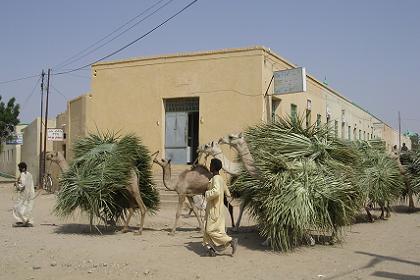
Carrying palm leaves to the market - Agordat Eritrea.
Small village - Agordat Eritrea.
